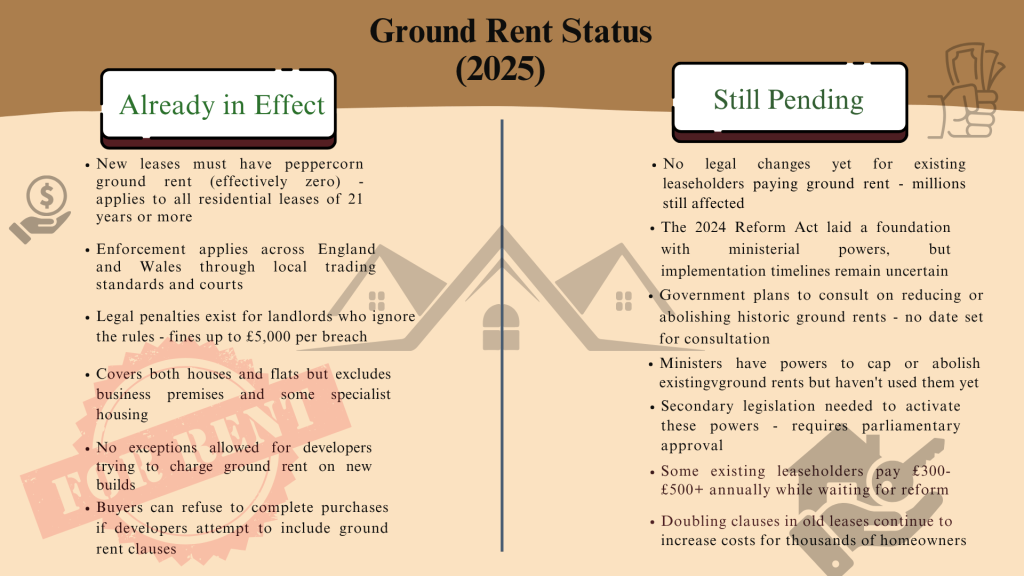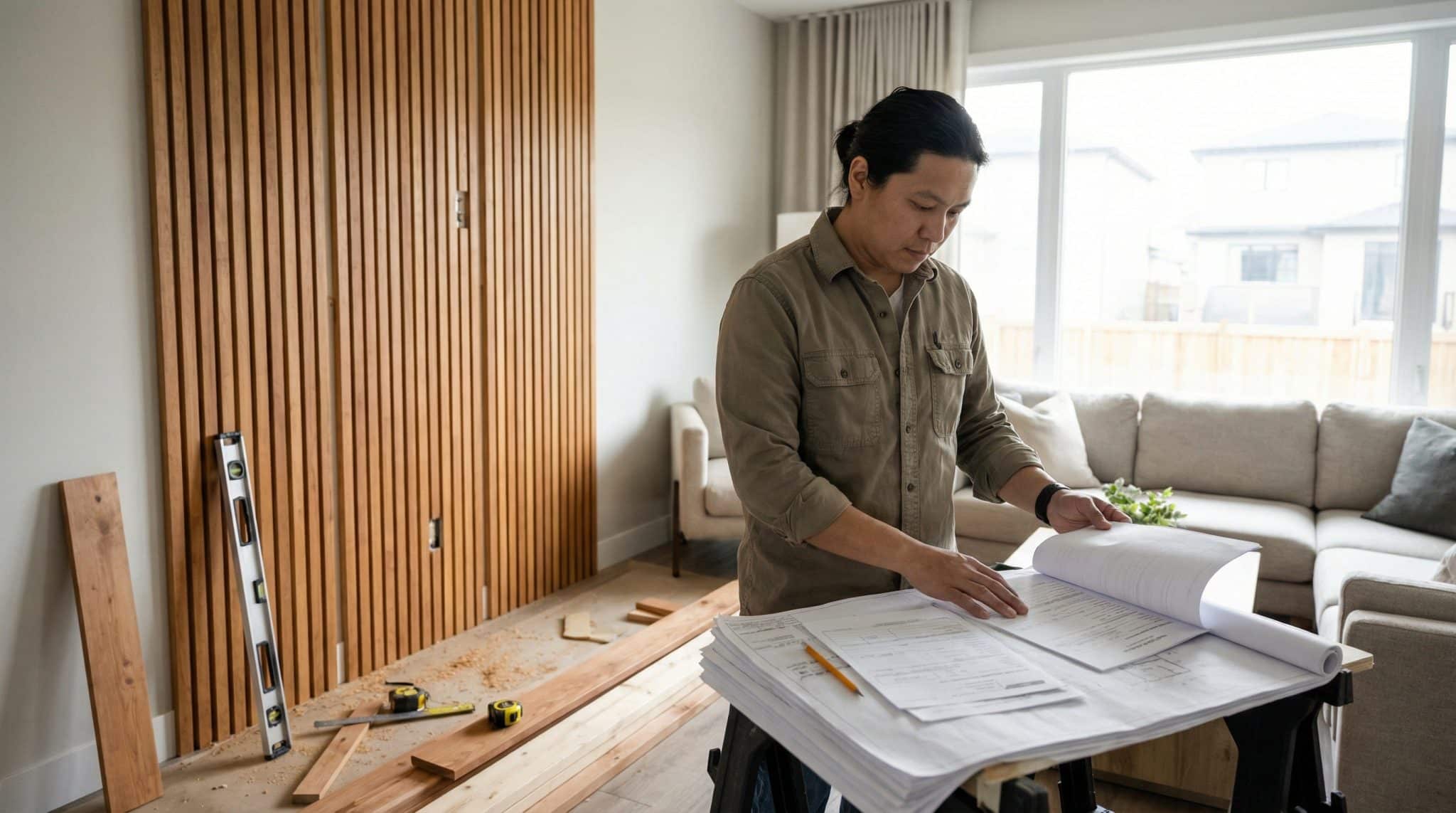Imagine never having to pay ground rent again. Could this become reality sooner than you think?
Ground rent charges have long frustrated homeowners. These annual payments seem unfair when you already own your property. Many leaseholders feel trapped by rising costs and confusing terms.
The UK government has taken serious steps toward ground rent reform. I’ll show you exactly when existing ground rents might disappear and what this means for your property.
Through this blog, I’ll explain the current status of ground rent abolition, share the latest timeline updates, and reveal what property owners can expect in 2025 and beyond.
You’ll also learn how these changes affect both leaseholders and landlords.
Let’s look at what’s really happening with ground rent reform and when it will be abolished.
What is Ground Rent?
Ground rent is an annual fee that leaseholders pay to the freeholder for the land on which their property sits. It’s a feature of the leasehold system, where homeowners don’t own the land beneath their property.
Originally, this system began centuries ago when landowners would lease plots to tenants who would build homes on them. The rent compensated owners for giving up land use while keeping ownership.
Ground Rent Related Controversy
However, ground rent became controversial when developers started exploiting the system:
- Some properties now face annual fees of £500 or more, with clauses that double payments every 10-25 years
- These escalating costs can make homes impossible to sell or remortgage
- Buyers realized they were paying twice – once through their mortgage and again through ground rent
- Many felt misled by developers who downplayed these ongoing costs during sales
- This dual payment system has trapped thousands of homeowners in properties they struggle to afford or sell
These issues have made properties harder to sell and forced mortgage lenders to reject high-ground-rent homes. The widespread problems across England and Wales pushed the government to prioritize leasehold reform.
When Will Existing Ground Rents Be Abolished?
There’s no official timeline for when existing ground rents will be abolished. The government has the legal power to cap or remove ground rent on existing leases, but ministers haven’t announced when they’ll exercise this authority.
Political experts suggest that reform could occur within 2-3 years, although the process requires public consultation, secondary legislation, and parliamentary approval.
Existing leaseholders can expect the abolition to be likely within the next few years, although the timing remains uncertain due to fluctuating political priorities.
|
Fact |
Overview of Leasehold Reform in the UK (2022–2024)
Leasehold reform between 2022 and 2024 has focused on reducing unfair ground rents, extending lease terms, and giving leaseholders more control over their homes.
Key changes are covered in two major Acts, laying the groundwork for wider reforms.
Leasehold Reform (Ground Rent) Act 2022
This Act was the first major step in ground rent reform, targeting new leases.
- Came into effect June 30, 2022, applying to all new leases granted after this date
- Abolished ground rent on most new long residential leases of 21 years or more
- Set rent to a peppercorn (effectively zero), meaning new leaseholders pay nothing annually
- Covers houses and flats but excludes business leases and some specialist housing
- Landlords who breach the law face financial penalties and potential legal action
Leasehold and Freehold Reform Act 2024
This broader Act expanded reform efforts and gave the government tools for future changes.
- Passed under the Conservative government in May 2024, just before the general election
- Extended standard lease terms to 990 years for both houses and flats (up from 90 years for flats and 50 years for houses)
- Streamlined enfranchisement and lease extensions by removing marriage value calculations and capping ground rent at zero during extensions
- Improved transparency in service charges and fees by requiring detailed annual statements and limiting administration charges
- Banned new leasehold houses (with limited exceptions for specific circumstances)
- Paved the way for future reform on existing ground rents through powers given to ministers to set caps or abolish them entirely
These reforms apply in England and Wales, although Wales may diverge slightly due to its devolved powers. New leases benefit immediately, while existing leaseholders await further reform.
Some changes require secondary legislation or consultation, so full implementation is still evolving.
Ground Rent Abolition Status in 2025
Ground rent no longer applies to most new leases, but it remains unchanged for older ones. However, existing leases with ground rent are still active, and full abolition has not yet been achieved.

Already in Effect
New leases must have peppercorn ground rent (effectively zero), and this applies to all residential leases of 21 years or more. The enforcement framework operates across England and Wales through local trading standards and courts.
Key provisions include:
- Legal penalties exist for landlords who ignore the rules – fines up to £5,000 per breach
- Coverage extends to both houses and flats, but excludes business premises and some specialist housing
- No exceptions allowed for developers trying to charge ground rent on new builds
- Buyers can refuse to complete purchases if developers attempt to include ground rent clauses
Still Pending
Despite the 2024 Reform Act laying a foundation with ministerial powers, implementation timelines remain uncertain for existing leaseholders. Millions continue to be affected with no legal changes yet implemented.
Current situation includes:
- Government plans to consult on reducing or abolishing historic ground rents – no date set for consultation
- Ministers have the power to cap or abolish existing ground rents, but haven’t used them yet
- Secondary legislation needed to activate these powers – requires parliamentary approval
- Some existing leaseholders pay £300-£500+ annually while waiting for reform
- Doubling clauses in old leases continues to increase costs for thousands of homeowners
Change depends on secondary legislation, consultation outcomes, and politics from the current government. Future governments may speed up or slow down progress based on their priorities.
What Investors Need to Know About Ground Rent?
Ground rent reform directly affects landlords and property investors who own freeholds or receive ground rent income. Understanding these changes is crucial for effective financial planning and informed investment decisions.
1. Immediate Impact on New Investments
New leasehold properties no longer produce rent income, shifting the investment model away from passive lease returns.
This affects property valuations and expected yields on new freehold purchases.
Development projects must comply with peppercorn ground rent rules. Developers who try to charge ground rent face fines up to £5,000 per breach.
This has shifted the business model for many property developers away from ground rent income.
Note: The ban on ground rent applies only to residential leases of 21 years or more, shorter leases and commercial properties can still include ground rent charges under current law.
2. Future Risks for Existing Ground Rent Income
Existing ground rent income remains legal but faces an uncertain future. Government powers to cap or abolish these payments could eliminate this income stream entirely.
Investors should not assume current ground rent levels will continue long-term.
Property valuations may need adjustment as ground rent abolition becomes more likely. Freehold properties valued partly on ground rent income could see significant value drops when reform happens.
Note: As legislative pressure builds, ground rent income is becoming a less reliable asset class. Investors may need to reassess how much weight they place on it when valuing freehold properties.
3. Planning for Change
Smart landlords are already adapting their strategies. Focus on service charge income, property management fees, and capital appreciation rather than ground rent.
Consider legal advice about portfolio restructuring before major reforms take effect.
Note: With ground rent income under threat, many forward-thinking investors are realigning their portfolios to prioritize sustainable revenue streams like service charges and long-term property value growth.
The Future of Ground Rent and Leasehold in the UK
The momentum for ground rent reform shows no signs of slowing down, with major changes expected in the coming years listed below:
- Ground rent is heading toward complete abolition across the UK, driven by public pressure that makes this change almost inevitable
- The leasehold system is facing major reforms, with new leasehold houses already being banned and 990-year lease terms making ownership closer to freehold
- Future governments may introduce commonhold systems, which are already in use in other countries, as property ownership in England and Wales moves toward simpler systems
- Ground rent income will disappear, and leaseholders will gain more control, meaning lower costs and greater security for homeowners
- For investors, this means focusing on property management and capital growth rather than ground rent income
These reforms represent a fundamental shift toward fairer property ownership, giving homeowners the control and security they deserve while reducing the financial burden of paying property taxes twice.
Bottom Line
Ground rent reform is no longer a question of “if” but “when.” With reforms already benefiting new leases, attention now shifts to abolishing existing ground rents.
While the exact timeline remains uncertain, with laws already in place, only the execution steps remain.
For existing leaseholders who pay hundreds annually, relief is on the way. The days of paying rent on land you thought you owned are numbered.
Investors will need to rethink their long-term value strategies, focusing on management income rather than extracting ground rent.
What’s your experience with ground rent? Share your thoughts in the comments below. Your insights could help other homeowners understand what’s really happening in the leasehold market.
Stay informed about these changes, as reform could happen quickly once ministers decide to act.
Frequently Asked Questions
What if You Don’t Pay Ground Rent?
Freeholders can charge interest, legal fees, and potentially forfeit your lease in extreme cases, though forfeiture requires court proceedings and is rare.
What States Have Ground Rent?
Ground rent is a UK system used in England and Wales. US states don’t have ground rent – this is specific to British leasehold property law.
What is the Cap on Ground Rent?
New leases have zero ground rent (peppercorn). Existing ground rents have no current cap, but the government may introduce limits through future legislation.














